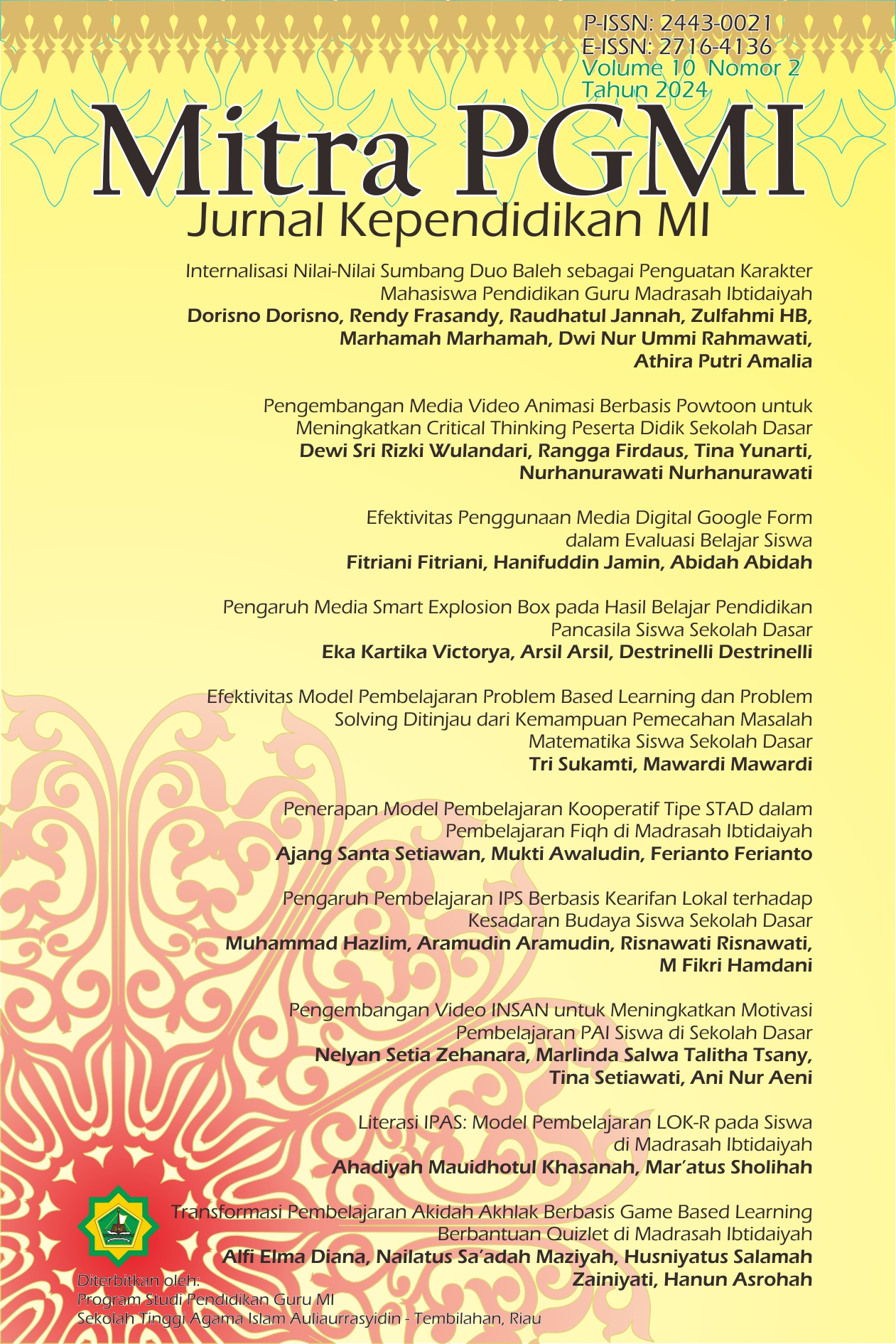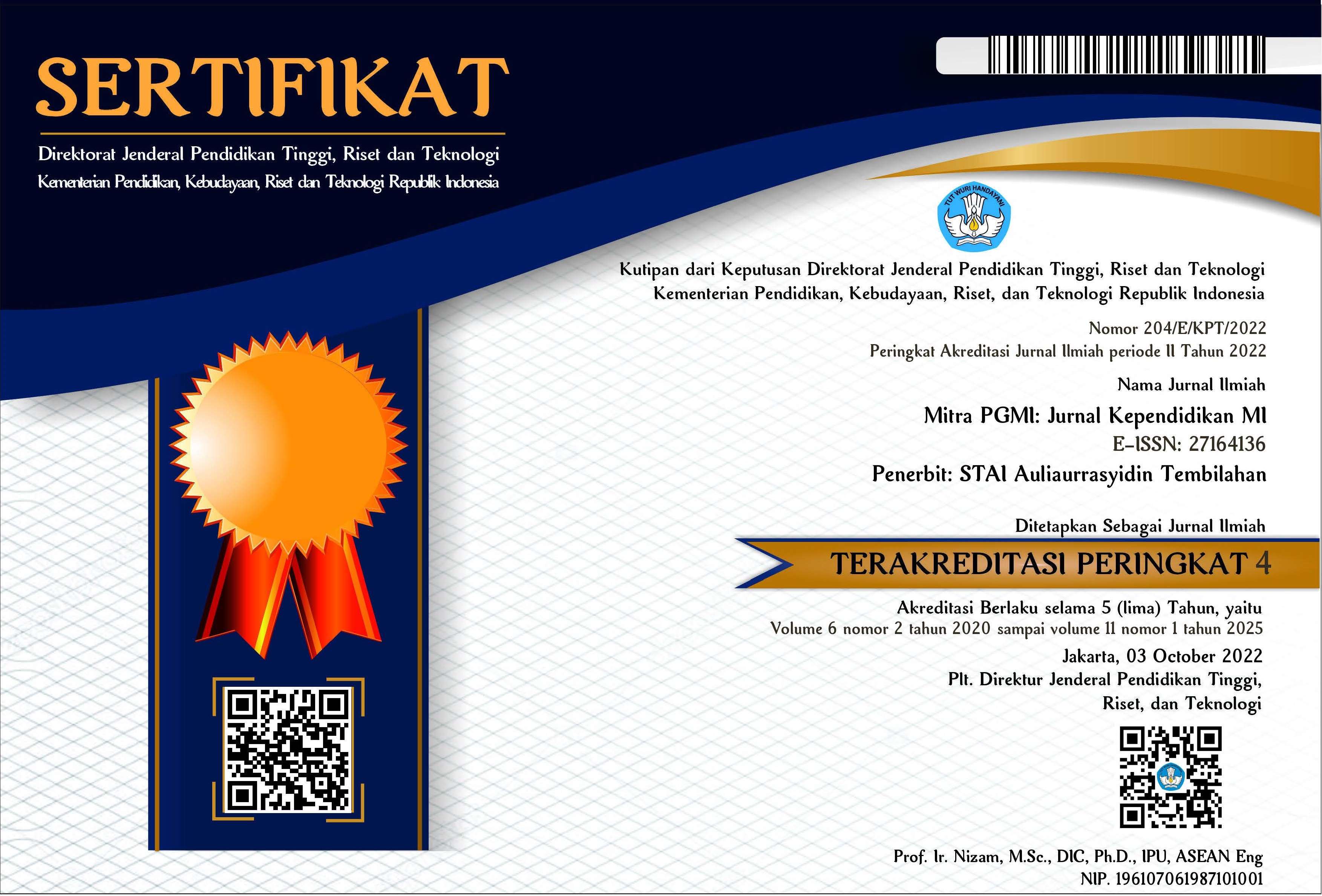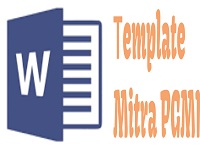Efektivitas Model Pembelajaran Problem Based Learning dan Problem Solving Ditinjau dari Kemampuan Pemecahan Masalah Matematika Siswa Sekolah Dasar
DOI:
https://doi.org/10.46963/mpgmi.v10i2.1862Keywords:
Problem Based Learning, Problem Solving, Elementary SchoolAbstract
This study aims to determine the difference in the effectiveness of Mathematics problem-solving between fifth-grade students of Gugus Dwija Wiyata Elementary School who use Problem-Based Learning (PBL) and Problem Solving (PS) learning models. The research method used is an experiment with a pretest-posttest control group design. Experimental Group 1 (PBL) consisted of 44 students, while Experimental Group 2 (PS) consisted of 43 students. Data were collected through pretests and posttests using test questions, and data analysis was performed using the t-test. The results showed a difference in effectiveness between Experimental Group 1 and Experimental Group 2, with a significance value (2-tailed) of 0.001 < 0.05. This indicates that the PBL learning model is more effective in improving Mathematics problem-solving skills compared to the PS model. Therefore, it is recommended that educators consider using the PBL learning model in Mathematics teaching at the elementary school level.
Downloads
References
Afnan Puji Astuti, D. W. S. P. G. S. D. U. K. S. W. dan. (2018). Pengaruh Model Pembelajaran Problem Based Learning Terhadap Kemampuan Pemecahan Masalah Matematika Siswa Sekolah Dasar.
Annur, A. F., Mulyani, T., Kartikawati, A., Fadhilah, M. N. (2022). Hasil Belajar Siswa Melalui Penerapan Model Problem Based Learning Di Min 9 Banda Aceh. Mitra Pgmi: Jurnal Kependidikan Mi, 8, 100–110. 3. https://doi.org/10.46963/mpgmi/v9i2.851.
Berliana Nurul Hidayah, Y., Virdinarti Putra, L., Kunci, K., Masalah, P., Berbasis Masalah, P., & Pemecahan Masalah, K. (2023). Perbedaan Model Pembelajaran Problem Solving Dan Problem Based Learning Berbantuan Papan Diagram Terhadap Kemampuan Pemecahan Masalah Siswa Sekolah Dasar. Journal On Education, 06(01), 1390–1396. https://doi.org/10.31004/joe.v6i1.3093.
Dede Anggiana, A. (2019). Implementasi Model Problem Based Learning (Pbl) Untuk Meningkatkan Kemampuan Pemecahan Masalah Matematis Siswa. Symmetry: Pasundan Journal of Research in Mathematics Learning and Education, 4(Volume 4). Https://Doi.Org/10.23969/Symmetry.V4i2.2061
Ezeddine, G., Souissi, N., Masmoudi, L., Trabelsi, K., Puce, L., Clark, C. C. T., Bragazzi, N. L., & Mrayah, M. (2023). The Problem-Solving Method: Efficacy For Learning and Motivation in The Field of Physical Education. Frontiers In Psychology, 13. https://doi.org/10.3389/Fpsyg.2022.1041252
Ismi, H., Witono, H., & Nurmawanti, I. (2023). Efektivitas Model Pembelajaran Problem Based Learning Terhadap Kemampuan Pemecahan Masalah Matematika Siswa Sd Kelas V Sdn 2 Terong Tawah the Effectiveness of The Problem Based Learning Learning Model On The Ability To Solve Mathematical Problems Of Grade. Renjana Pendidikan Dasar, 3(3).
Jana, P., & Supiati, E. (2019). Efektivitas Model Problem Based Learning Ditinjau Dari Kemampuan Pemecahan Masalah Matematika. Jurnal Mercumatika: Jurnal Penelitian Matematika Dan Pendidikan Matematika, 3(2). https://doi.org/10.26486/Jm.V3i2.745
Junaedi, A., Rozi, F., & Rumiyanti, R. (2023). This Work Is Licensed Under A Creative Commons Attribution-Sharealike 4.0 International License Cc By Sa Mitra Pgmi: Gaya Belajar Savio: Membentuk Pelajar Multitalent Dalam Pembelajaran Bahasa Arab. 90–105.
Maesari, C., & Marta, R. (2019). Nomor 1 Tahun 2019 Halaman 92-102. In Journal on Teacher Education Research & Learning in Faculty Of Education Journal On Teacher Education 1 Nomor 1 Tahun (Vol. 1).
Puji Astuti, W., Indarini, E., Pendidikan Guru Sekolah Dasar, J., & Kristen Satya Wacana, U. (2018). Efektivitas Model Pembelajaran Problem Based Learning Dan Problem Solving Terhadap Kemampuan Berpikir Kreatif Matematika. Pps Universitas Pendidikan Ganesha Jipp, 2.
Putri, U. A., & Wahyudi, W. (2020). Efektivitas Model Problem Based Learning Dan Problem Solving Ditinjau Dari Kemampuan Pemecahan Masalah Matematika Peserta Didik Kelas Iv Sd. Jurnal Edukasi Matematika Dan Sains, 8(1), 69. https://doi.Org/10.25273/Jems.V8i1.6088
Salgado-Chavarría, D., & Palacios-Alquisira, J. (2021). Problem-Based Learning Approach to Review the Green Chemistry Principles When Applied to A Polycondensation Reaction. Science Education International, 32(2), 107–113. https://doi.org/10.33828/Sei.V32.I2.3
Sampini. (2021). Problem Based Learning Dan Problem Solving Berpengaruh. Problem Based Learning Dan Problem Solving Berpengaruh Terhadap Kemampuan Pemecahan Masalah Matematika, 26(1), 2021.
Saputri, Y., & Wardani, K. W. (2021). Meta Analisis: Efektivitas Model Pembelajaran Problem Solving Dan Problem Based Learning Ditinjau Dari Kemampuan Pemecahan Masalah Matematika Sd. 05, 935–948.
Sugiyono. (N.D.). Metode Penelitian Kuantitatif Kualitatif Dan R&D (P. 444).
Tina Mardiyana, & Kulon, P. (2020). Kalam Cendekia: Jurnal Ilmiah Kependidikan Penerapan Model Problem Solving Learning Untuk Meningkatkan Kemampuan Pemecahan Masalah Matematika. Kalam Cendekia: Jurnal Ilmiah Kependidikan Penerapan Model Problem Solving Learning Untuk Meningkatkan Kemampuan Pemecahan Masalah Matematika.
Winarso. (n.d.). Problem Solving, Creativity Dan Decision Making Dalam Pembelajaran Matematika Widodo Winarso (Vol. 3).
Zainal, N. F. (n.d.). Problem Based Learning Pada Pembelajaran Matematika Di Sekolah Dasar/ Madrasah Ibtidaiyah. Jurnal Basicedu, 6(3), 3584–93. https://doi.org/10.31004/basicedu.v6i3.2650
Downloads
Published
Issue
Section
License
Copyright (c) 2024 Tri Sukamti, Mawardi Mawardi

This work is licensed under a Creative Commons Attribution-ShareAlike 4.0 International License.
Authors who publish with this journal agree to the following terms:
1. Copyright on any article is retained by the author(s).
2. The author grants the journal, right of first publication with the work simultaneously licensed under a Creative Commons Attribution shareAlike 4.0 International License that allows others to share the work with an acknowledgment of the work’s authorship and initial publication in this journal.
3. Authors are able to enter into separate, additional contractual arrangements for the non-exclusive distribution of the journal’s published version of the work (e.g., post it to an institutional repository or publish it in a book), with an acknowledgment of its initial publication in this journal.
4. Authors are permitted and encouraged to post their work online (e.g., in institutional repositories or on their website) prior to and during the submission process, as it can lead to productive exchanges, as well as earlier and greater citation of published work.
5. The article and any associated published material is distributed under the Creative Commons Attribution-ShareAlike 4.0 International License








2.png)


